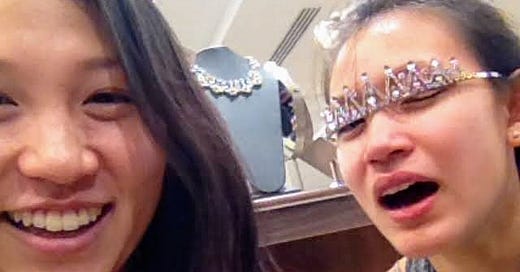Prompt #11: Fairytales and Literary Truth
How to illuminate truth without being self-actualized (part II)
I want to stay with Steph’s topic from last week, “how to illuminate truth without being self-actualized,” because, well, it’s a great question.
The idea that writing can surprise us with things we didn’t know prior to writing, isn’t a new one. In “Why I Write,” Joan Didion describes:
“I write entirely to find out what I’m thinking, what I’m looking at, what I see and what it means. What I want and what I fear. Why did the oil refineries around Carquinez Strait seem sinister to me in the summer of 1956? Why have the night lights in the Bevatron burned in my mind for twenty years? What is going on in these pictures in my mind?”
This is a sentiment many writers and artists share— that we write to find out something we didn’t already know. But how can this be? How can we get the truth of the matter to show up on the page when we don’t know what it is ahead of time?
Last week Steph proposed that living our questions— refusing the terms of a question, asking a larger question, letting images & what we don’t know take the place of answers— is itself a coherent, creative act, and in that way, gets the truth of the matter on the page. I agree. I also want to add that I think truth can come from within language itself.
Elena Ferrante describes the purpose of her writing as a pursuit of literary truth.
“Literary truth is the truth released exclusively by words used well, and it is realized entirely in the words that formulate it. It is directly proportional to the energy that one is able to impress on the sentence.”
Notice that her definition of literary truth doesn’t require preexisting knowledge, only words, used well.
Language itself— its texture, sounds, arrangement— carries an energy and coherence; in fact, spells, chants, affirmations, invocations to the Muses are all patterns of language that people have used to generate noticeable effects. Whether or not they carry “truth” or “information,” whether or not they even makes sense to us, words, used well, carry power.
Are there forms of language, arrangements of sound, that can help us with tough questions? I think there are many. One form that comes quickly to mind is the form of fairytale/folktale/legend. A fairytale is an arrangement of words that sets a mood at once fantastical and whimsical and also, often carries its reader steadily towards clear lessons and answers.
For this week, let the language of fairytale / folktale / legend, infuse your poem. Some ideas:
Take an existing poem that’s confounding you, or feels uninspired, and replace parts of it with fairytale-esque names, or characters — The Snoop, The Heart, The Woodcutter, The Watchmaker.
Add an element of fiction to the poem to open it up. See Dean Young’s poem “Arts of Camouflage” which hinges around the speaker’s transformation into a panther.
Start your poem with “Once upon a time,” or the opening phrase of any folktale. After the poem is written, see what happens if you remove this opening phrase.
Happy Monday, happy writing, and hope to see you in the comments!
xoxo,
Catherine



